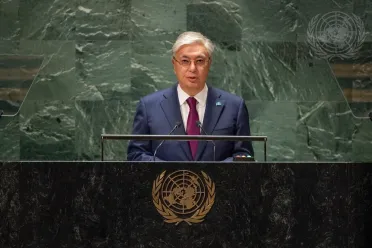Statement
Statement summary
KASSYM-JOMART TOKAYEV, President of Kazakhstan, stressed that humanity faces another period of geopolitical confrontation from eroding international principles. The pattern of non-compliance and withdrawal from international institutions “is extremely concerning as it could lead to the point of no return”, he warned. He urged all parties to conflicts — including the Ukrainian crisis — to seek diplomatic solutions based on the United Nations Charter and universally recognized international law. Calling for comprehensive Security Council reform, he emphasized that “the voices of middle Powers and all developing countries need to be amplified and clearly heard” to meet the interests of most of humanity. Since the Council appears unable to move beyond deadlock, it should become more representative so other countries can play a greater role in maintaining peace and security. The growing engagement of Central Asian States has been a positive force in transforming the Conference on Interaction and Confidence-building Measures in Asia into a full-fledged international organization which can contribute to mediation and peacemaking.
“Of all the challenges we face,” he continued, the most destructive is the threat of nuclear weapons. As Kazakhstan voluntarily renounced the world’s fourth largest nuclear arsenal 30 years ago, only mutual trust and cooperation between nuclear Powers can produce global stability and a world free of nuclear weapons. In this regard, a strategic plan to completely renounce nuclear weapons by 2045 would be this generation’s most significant contribution to global security. Further, he highlighted interfaith dialogue and the principles of unity in diversity and mutual respect in order to foster a culture of peace. All holy books, including the Qur’an, deserve legal protection against barbarism and acts of profound disrespect that cannot be accepted as expressions of freedom, free speech or democracy.
Additionally, with Central Asia on the front lines of a 2 °C to 2.5°C temperature rise, he insisted that “we must all remain committed to a carbon-free future”. The urgency of climate action risks becoming a dangerous cliché, because immediate and transformational steps are required to protect the environment. Instead of using the climate agenda to restrict trade and investment, “we must focus on positive change,” he said, such as investing in green jobs, ending fossil fuel subsidies, and ensuring that all climate actions are fair and inclusive — involving women at all levels. He proposed launching a just energy transition partnership in Kazakhstan, where a gradual, sustainable, and socially responsible transition away from coal would be a big bonus for global climate goals. Without proper funding, however, ambitious plans will remain unmet. Furthermore, water scarcity in the region has created serious economic challenges that foreshadow global concerns, where demand for water may outstrip supply by as much as 40 per cent by 2040.
Noting that nearly 10 per cent of the world’s population faced hunger last year, he called for a better global food security system that boosts information exchange and the international response to food crises. “Kazakhstan is ready to act as a regional food supply hub,” he declared, as a “reliable link for nearly 80 per cent of overland transit traffic between Asia and Europe” and with “all the required resources, infrastructure, and logistics in place”. The Trans-Caspian International Transport Route, the so-called “Middle Corridor”, can strengthen East-West engagement and increase the pace of trade between critical markets. More broadly, he called on all Member States to support the timely establishment in Almaty of a United Nations regional centre for sustainable development goals for Central Asia and Afghanistan. Additionally, he called for the launch of an international agency for biological safety, in response to the COVID-19 pandemic’s painful illustration of the world’s vulnerability to biological threats.
Full statement
Read the full statement, in PDF format.
Photo

Previous sessions
Access the statements from previous sessions.
